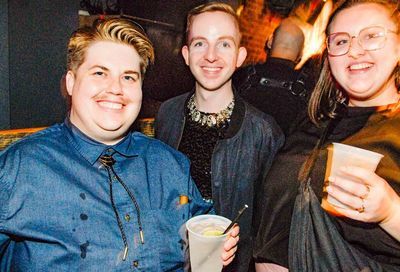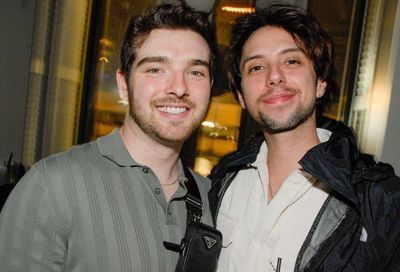Indiana Senate committee passes Trojan horse nondiscrimination bill
Measure's religious exemptions render enforcement of LGBT protections toothless

Despite attempts to give their state a much-needed public relations makeover, Hoosier lawmakers have fallen short in passing comprehensive protections for Indiana’s LGBT citizens.
In a 7-5 vote, the Indiana Senate Rules & Legislative Procedure Committee approved a so-called “nondiscrimination” bill that purports to protect LGB people from unfair treatment in employment, education, credit, housing and public accommodations. But the bill also contains significant religious exemptions that undermine those protections, and excludes the same protections for transgender Hoosiers, such as a “conscience clause” exemption allowing adoption and child placement agencies to discriminate against same-sex couples.
The bill would also prohibit local municipalities from passing any new, fully-inclusive nondiscrimination ordinances. By promoting the bill, Republican lawmakers have attempted to salvage their state’s reputation, which took a hit after passing Indiana’s Religious Freedom Restoration Act (RFRA) last year.
Pro-equality groups pounced on the legislation as insufficient, arguing that it still provides exemptions that are far too broad and will enable those who wish to discriminate against members of the LGBT community.
“Once again, Indiana lawmakers are trying to pass a bill that unacceptably leaves LGBT Hoosiers at continued risk of discrimination, and now even includes dangerous RFRA-like language attached as an amendment that strips away last year’s so-called ‘fix,” Sarah Warbelow, HRC’s legal director, said in a statement. “SB 344 is deeply flawed across a number of areas, but most importantly, it would leave transgender Hoosiers behind. With the new amendment attached, it could now also allow anyone to wield religion as a sword of discrimination. We implore the Indiana Legislature to abandon this dangerous legislation, and instead seek to pass fully inclusive non-discrimination protections that would truly safeguard LGBT Hoosiers and visitors from discrimination.”
Critics of the legislature have also criticized a second bill, SB 100, which is almost identical in scope to SB 344, and also provides far-reaching exemptions that would allow discrimination under the guise of religion. And other bills fill in the holes left by both “nondiscrimination” bills as they pertain to transgender rights. For instance, one bill would criminalize transgender people who use restroom or changing facilities other than those designated for their biological sex.
And while a proposed “super-RFRA” that would have allowed anybody to actively discriminate against LGBT people by citing religious or moral objections failed to pass in committee, two other pro-LGBT bills have failed to gain significant traction. Both of those bills — one introduced by a Democrat and one by a Republican — would amend the state’s current nondiscrimination laws to include sexual orientation and gender identity, have failed to gain significant traction.
Indiana’s attempts to pass some sort of measure extending some form of LGBT protections is motivated in part by the negative press and financial backlash felt by the state in wake of the passage of the RFRA law. The law’s passage allowed the Hoosier State to be tarred with a negative brush, with some states or municipalities boycotting or banning official state travel to Indiana, some businesses suggesting they would avoid holding events in the state, and other businesses expressing concern that the law could inhibit their attempts to attract potential employees if they were to set up shop in the state.
According to a survey from the tourism group Visit Indy, the Hoosier state is estimated to have lost as much as $60 million in hotel profits, tax revenue and other economic benefits after a dozen groups decided against holding conventions in Indianapolis following the passage of the RFRA law. The Associated Press reports that the International Association of Fairs and Expositions was one of the dozen organizations to bypass the Hoosier State when it was looking for a place to hold its annual convention. Visit Indy also notes that all 12 businesses that had bypassed the state for their conventions specifically mentioned controversy over the RFRA law as a contributing factor to why they chose not to do business in Indiana.
“We’d say, ‘Why didn’t you select Indy?’ and they proactively cited (the law) as a reason they did not select Indianapolis,” Chris Gahl, vice president of marketing and communications for Visit Indy, told the AP. “That is not news you want to hear when you are in the business of marketing a city.”
Support Metro Weekly’s Journalism
These are challenging times for news organizations. And yet it’s crucial we stay active and provide vital resources and information to both our local readers and the world. So won’t you please take a moment and consider supporting Metro Weekly with a membership? For as little as $5 a month, you can help ensure Metro Weekly magazine and MetroWeekly.com remain free, viable resources as we provide the best, most diverse, culturally-resonant LGBTQ coverage in both the D.C. region and around the world. Memberships come with exclusive perks and discounts, your own personal digital delivery of each week’s magazine (and an archive), access to our Member's Lounge when it launches this fall, and exclusive members-only items like Metro Weekly Membership Mugs and Tote Bags! Check out all our membership levels here and please join us today!




















